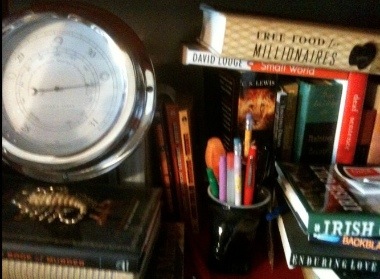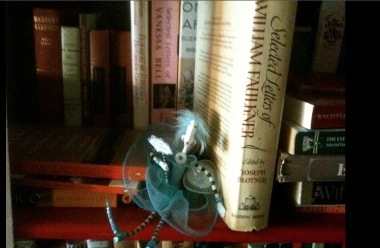One if the hot topics this Christmas season has been e-readers versus books. As you can imagine, I have Opinions. I’m a bit undecided on whether anybody has convinced me that one or the other is better for the environment. So we will deviate from a strictly environmental theme here to aesthetic and use themes. While people routinely lecture me about how The World Will Be Better if people like me stopped reading and just Watched Things or Looked at Screens (barf) to save paper and printing, my usual response is that I will give up books when they stop driving, eating meat or–frankly, much much much better for the environment–limit themselves to having just one American child. (There’s always the global environmental benefit of eating Americans rather than factory-farmed meat, but that one hits too close to home as I am both slow and plump and annoying, so I’d be likely to be amongst the first harvested.)
As the owner of an iPad (which I do love and use extensively), I have the Kindle software. And I am utterly shocked at how useful I’ve found it. Here’s what I’ve found: I like to have both hard copies and e-copies of textbooks I am using for class or for reference books I use a lot for research. Here’s the type of book I like to have loaded on the Kindle/e-reader:
Gaeten, Carlo and Xavier Guyon. Spatial Statistics and Modeling. Springer Publishers.
I use this book CONSTANTLY for research. It’s so much easier to have it on my electronic entourage (the laptop, the iPhone, the iPad) than it is to carry around. If I am working at home, inevitably the book is my school office. Kindle version: right there.
Alternatively, if I have assigned a textbook, I can load it on my e-reader and I can refresh my reading of that book—which, chances are, I haven’t done for a year or so— to prepare for class. And I can do that any time I have my computer, iPad, or iphone with me.
I usually subscribe to both the print version and the electronic version of the magazines I take seriously, like the New Republic or the Chronicle of Higher Education or the Economist. I get a print version of the LA Times for Andy, as he reads it cover to cover.
Books, however, are entirely an different good to me than e-books. A love letter will never slip from the between the pages of an e-reader; yet I routinely find little discoveries in the library books I borrow and the used books I buy. Yes, you can annotate on an e-reader, but it’s not the same as buying a used book and finding another person’s notes. What did this person think? Why did he underline that passage? There’s a receipt here for a bookstore–obviously the local one she bought the book in, long gone now, as is probably the book’s former owner.
I love new books, I love old books, I love library books, I love ordering books online and walking to my local bookstores: Metropolis Books, the Last Bookstore, and Caravan Books. I love riding the bus to Book Soup in WeHo or Vroman’s in Pasadena.
My books are my friends. Their cheery covers greet me when I come in to the apartment. I keep many books I’ve read–looking at my shelves, it’s like encountering old friends. Other books I pass along: a Dennis Lehane thriller is great for a week, but he doesn’t need my space. John Le Carre, however, deserves prominence of place.
Realtors tell me to get rid of the books. Realtors who say this, I get rid of.
I will never feel this love for the e-reader. There is a difference between the utilitarian content of the book and its wondrous material form: just like I love iTunes for its portability, nothing replaces vinyl, with its sound quality and beautiful album materials. People who do not understand this distinction are also unlikely to understand why my husband and I dress up for each other even when we are staying at home for dinner. How silly it probably seems: to go to the trouble of putting on make up and setting out linen napkins just for the two of us, when we have lived as constant companions for years and years and now never spend a night apart if we can help it.
But dinner together is an occasion, and unless you are careful, your whole life will be lived in jeans and drawstring pants.
Sometimes, you should make things special.
Our material lives–the physical things we handle–should delight us and reflect the human capacity to create beautiful things. That’s why I have always been a Mac user: it’s expensive, but looks great if I leave it out in the apartment. That’s why I advocate for urban design even though I don’t think for five seconds it’s a form of urban regulation that will substantially get people out of their cars, make them skinnier, or change people. It’s enough–it’s simply enough–to create a beautiful place for people to experience. Joy is a necessity.
My material life is a jumble: my guests routinely raise their eyebrows and comment about how they prefer to keep things tidy or “minimal.” Other than the fact that’s a rude thing to say to somebody who has shown you hospitality, I would like to respond to them that every time I’ve been in their homes, I’ve felt like it’s as cold as a museum–homogenous and devoid of personality–and just as unsettling to me as my whirlpool of objects is to them. But I was raised nicely and never say such things.
A sampling of the ecology in my bookshelves, using quick shots from the camera phone:



